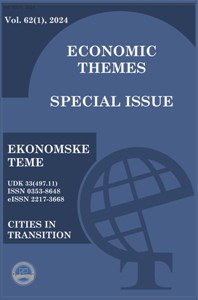Economic Themes (2024) 62 (1) 2, 19-43
Asim Lamsal, Markus Emanuel Wehrmeister Tonjer
Abstract: The transportation sector is a major contributor to greenhouse gas emissions, and Norway is one of the leading countries in transitioning to zero and low-emitting private transportation. In 2022, over 80% of new cars sold there were electric or hybrid. This study explores the dynamics between public charging infrastructure and EV diffusion in Norway. Though home charging in Norway is widespread, public infrastructure plays a role, too. This study investigates factors influencing their link to EV adoption. The study employs a multifaceted approach in leveraging municipality-level data from 2020 to 2022. Initial Ordinary Least Squares (OLS) regression provided a baseline understanding, followed by hot spot analysis to identify spatial clusters of high and low EV adoption. Geographically Weighted Regression (GWR) and Multilevel Geographically Weighted Regression (MGWR) unveiled finer-grained local variations in the public charging infrastructure-EV diffusion relationship across 356 municipalities and 11 counties. Municipalities with more stations exhibit higher EV usage. This study underscores the significance of developing public charging infrastructure for EV adoption. Additional influencing factors, such as EV cost, availability of new models, and public perception, are also identified. The findings offer valuable insights for policymakers and stakeholders promoting EV adoption.
Keywords: Public charging stations; Electrical vehicles; Norway
ESTABLISHMENT OF PUBLIC CHARGING STATIONS: FACTORS FOR THEIR HIGH DIFFUSION IN NORWAY
Asim Lamsal, Markus Emanuel Wehrmeister Tonjer
Abstract: The transportation sector is a major contributor to greenhouse gas emissions, and Norway is one of the leading countries in transitioning to zero and low-emitting private transportation. In 2022, over 80% of new cars sold there were electric or hybrid. This study explores the dynamics between public charging infrastructure and EV diffusion in Norway. Though home charging in Norway is widespread, public infrastructure plays a role, too. This study investigates factors influencing their link to EV adoption. The study employs a multifaceted approach in leveraging municipality-level data from 2020 to 2022. Initial Ordinary Least Squares (OLS) regression provided a baseline understanding, followed by hot spot analysis to identify spatial clusters of high and low EV adoption. Geographically Weighted Regression (GWR) and Multilevel Geographically Weighted Regression (MGWR) unveiled finer-grained local variations in the public charging infrastructure-EV diffusion relationship across 356 municipalities and 11 counties. Municipalities with more stations exhibit higher EV usage. This study underscores the significance of developing public charging infrastructure for EV adoption. Additional influencing factors, such as EV cost, availability of new models, and public perception, are also identified. The findings offer valuable insights for policymakers and stakeholders promoting EV adoption.
Keywords: Public charging stations; Electrical vehicles; Norway

